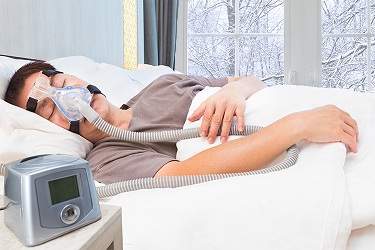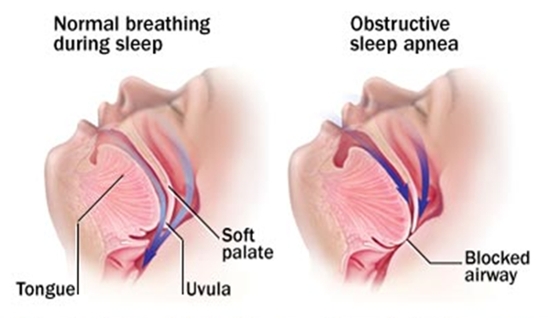Obstructive Sleep Apnea Increases Risk Of COVID-19 Severity According To University Of Helsinki, Harvard, Stanford And Massachusetts General Hospital Study
Source: Obstructive Sleep Apnea Sep 30, 2020 5 years, 3 months, 1 week, 12 hours, 59 minutes ago
Obstructive Sleep Apnea (OSA) increases the risk of severe COVID-19 according to a new research led by University of Helsinki-Finland and involving Broad Institute of MIT, Harvard, Stanford University and Massachusetts General Hospital.

Information regarding obstructive sleep apnea (OSA) diagnosis and COVID-19 infection was extracted from the FinnGen study (N=260,405) with a total of 305 patients who had a recorded PCR-validated COVID-19 infection including 26 (8.5%) individuals who were also OSA patients. Severe COVID-19 (N=83; 27.2%) was defined as an infection requiring hospitalization. Among the hospitalized individuals there were 16 (19.3%) with OSA diagnosis. In addition, the study team also included in their analysis previously reported risk factors for both severe COVID-19 or risk factors and comorbidities for OSA from FinnGen.
The study findings were published on a preprint server and are pending peer-review.
https://www.medrxiv.org/content/10.1101/2020.09.26.20202051v1
The study team was motivated to conduct the study with a larger patient biobank and health database to assess the correlation between obstructive sleep apnea and COVID-19 based on three smaller past studies.
https://jcsm.aasm.org/doi/10.5664/jcsm.8596
https://jcsm.aasm.org/doi/10.5664/jcsm.8538
https://www.medrxiv.org/content/10.1101/2020.05.14.20098319v1
The three small studies reported that obstructive sleep apnea (OSA) might be a potential risk factor for severe COVID-19. Obstructive sleep apnea (OSA) is a sleep disorder characterized by repetitive apnea-hypopnea cycles during sleep, which causes shortness of breath and can often lead to sleep disruption, severe oxygen desaturation, and an increase in systolic and diastolic blood pressure.
It was found that the common risk factors for obstructive sleep apnea (OSA) are older age, obesity, male sex, and upper-airway structure anomalies. Since OSA affects nearly 8% of the population and has a higher prevalence of over 20% in individuals above 60 years, its association with the risk of severe COVID-19 infection leading to hospitalization is worrying.
The main objective of the study was to investigate if obstructive sleep apnea (OSA ) patients were at an elevated risk of contracting COVID-19 and developing the severe form of the disease leading to hospitalization. The team conducted a retrospective case-control study with the help of the FinnGen Study cohort, the National Infectious Diseases Registry, Finnish National Hospital Discharge Registry, and Causes of Death Registry.
All data and details of obstructive sleep apnea (OSA) diagnosis and infection with COVID-19 of 305 patients were gathered from the FinnGen study. All the patients tested RT-PCR positive for COVID-19 infection, and 26 (8.5%) of these patients also had OSA. Infections requiring hospitalization were considered as severe COVID-19. Among the severe COVID-19 patients, 16 (19.3%) individuals had OSA. Additionally, the team also a
nalyzed other proven risk factors for both OSA and severe COVID-19 from the FinnGen data.
The study results showed that OSA patients with COVID-19 were at 5 times more risk of developing complications and being hospitalized. OSA is an independent risk factor for severe COVID-19 that requires hospitalization. It elevated the risk regardless of age, sex, hypertension, body mass index, diabetes, asthma, and chronic obstructive pulmonary disease, and coronary heart disease.
Professor Dr Satu Strausz from the Institute for Molecular Medicine Finland (FIMM), University of Helsinki, a senior co- researcher told Thailand Medical News, “Our findings are in line with the previous reports which have hypothesized the connection between obstructive sleep apnea and COVID-19 as they share a number of comorbidities and risk factors”.
He warned, ”Furthermore, as OSA acerbates the effects of many underlying risk factors increasing blood pressure and decreasing oxygen saturation level, our findings together with earlier reports suggest that OSA should to be taken into account when assessing who will develop life threatening complications of COVID-19 infection.“
The study findings however showed that OSA was not associated with the risk of contracting COVID-19 infection.
From the analysis done in this study, the study team concluded that obstructive sleep apnea or OSA patients have a 5-fold risk of being hospitalized when they have a COVID-19 infection compared to individuals without OSA. However, another key finding was that OSA patients are not at a higher risk of contracting COVID-19 infection than individuals without OSA.
The study findings suggest that during the assessment of suspected or confirmed COVID-19 patients, obstructive sleep apnea (OSA) should be considered a comorbidity risk factor for developing a severe form of COVID-19. These findings agree with previous reports that suggested a connection between OSA and severe COVID-19 risk because they share many risk factors and comorbidities.

Although previous reports suggested that men are at elevated risk of COVID-19, this study found that COVID-19 infection was more prevalent in women. Also, women with severe COVID-19 infection were older than men (women - 69.5 years and men - 61.9 years). These characteristics may explain why the majority of the hospitalized individuals were women.
Dr Strausz added, “Our study findings should be interpreted in the context that registry-based ascertainment through hospitalization may miss non-hospitalized obstructive sleep apnea cases (false negatives) and treatment information such as CPAP or MAD compliance.”
For more on
Obstructive Sleep Apnea (OSA) and COVID-19, keep on logging to Thailand Medical News.

